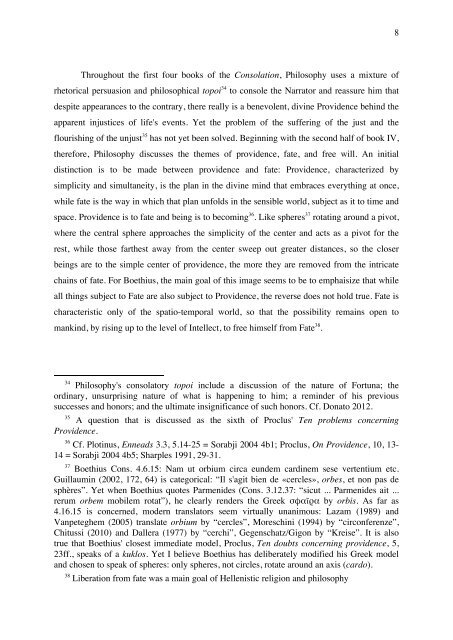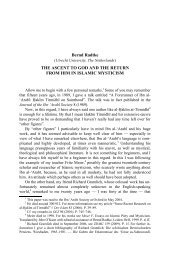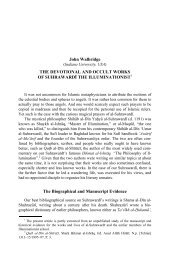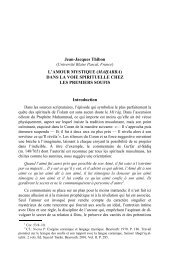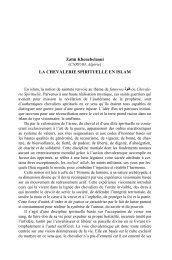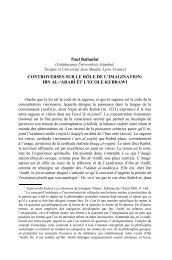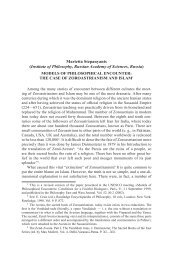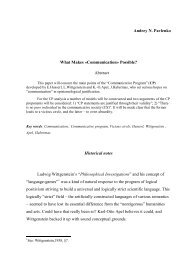Bothius talk DEF
Bothius talk DEF
Bothius talk DEF
You also want an ePaper? Increase the reach of your titles
YUMPU automatically turns print PDFs into web optimized ePapers that Google loves.
8<br />
Throughout the first four books of the Consolation, Philosophy uses a mixture of<br />
rhetorical persuasion and philosophical topoi 34 to console the Narrator and reassure him that<br />
despite appearances to the contrary, there really is a benevolent, divine Providence behind the<br />
apparent injustices of life's events. Yet the problem of the suffering of the just and the<br />
flourishing of the unjust 35 has not yet been solved. Beginning with the second half of book IV,<br />
therefore, Philosophy discusses the themes of providence, fate, and free will. An initial<br />
distinction is to be made between providence and fate: Providence, characterized by<br />
simplicity and simultaneity, is the plan in the divine mind that embraces everything at once,<br />
while fate is the way in which that plan unfolds in the sensible world, subject as it to time and<br />
space. Providence is to fate and being is to becoming 36 . Like spheres 37 rotating around a pivot,<br />
where the central sphere approaches the simplicity of the center and acts as a pivot for the<br />
rest, while those farthest away from the center sweep out greater distances, so the closer<br />
beings are to the simple center of providence, the more they are removed from the intricate<br />
chains of fate. For Boethius, the main goal of this image seems to be to emphaisize that while<br />
all things subject to Fate are also subject to Providence, the reverse does not hold true. Fate is<br />
characteristic only of the spatio-temporal world, so that the possibility remains open to<br />
mankind, by rising up to the level of Intellect, to free himself from Fate 38 .<br />
34 Philosophy's consolatory topoi include a discussion of the nature of Fortuna; the<br />
ordinary, unsurprising nature of what is happening to him; a reminder of his previous<br />
successes and honors; and the ultimate insignificance of such honors. Cf. Donato 2012.<br />
35<br />
A question that is discussed as the sixth of Proclus' Ten problems concerning<br />
Providence.<br />
36 Cf. Plotinus, Enneads 3.3, 5.14-25 = Sorabji 2004 4b1; Proclus, On Providence, 10, 13-<br />
14 = Sorabji 2004 4b5; Sharples 1991, 29-31.<br />
37 Boethius Cons. 4.6.15: Nam ut orbium circa eundem cardinem sese vertentium etc.<br />
Guillaumin (2002, 172, 64) is categorical: “Il s'agit bien de «cercles», orbes, et non pas de<br />
sphères”. Yet when Boethius quotes Parmenides (Cons. 3.12.37: “sicut ... Parmenides ait ...<br />
rerum orbem mobilem rotat”), he clearly renders the Greek σφαῖρα by orbis. As far as<br />
4.16.15 is concerned, modern translators seem virtually unanimous: Lazam (1989) and<br />
Vanpeteghem (2005) translate orbium by “cercles”, Moreschini (1994) by “circonferenze”,<br />
Chitussi (2010) and Dallera (1977) by “cerchi”, Gegenschatz/Gigon by “Kreise”. It is also<br />
true that Boethius' closest immediate model, Proclus, Ten doubts concerning providence, 5,<br />
23ff., speaks of a kuklos. Yet I believe Boethius has deliberately modified his Greek model<br />
and chosen to speak of spheres: only spheres, not circles, rotate around an axis (cardo).<br />
38 Liberation from fate was a main goal of Hellenistic religion and philosophy


